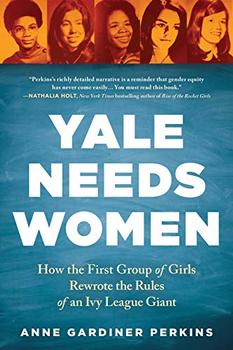Summary | Excerpt | Reading Guide | Discuss | Reviews | Beyond the Book | Readalikes | Genres & Themes | Author Bio

How the First Group of Girls Rewrote the Rules of an Ivy League Giant
by Anne Gardiner Perkins
Out on Martha's Vineyard, the days grew shorter with the coming fall; the time to pack away the Bermuda shorts drew near. Brewster finished his president's report and readied to return to campus, not yet realizing that the agenda for the year ahead would be set not by him, but by students.
* * *
To Yale senior Derek Shearer, the idea that women were not good enough to attend a college like Yale made no sense. He had only to look at his family for evidence to the contrary. His sister Brooke was one of the smartest kids in her high school. His mother wrote for local and national magazines, and Derek felt proud to write journalist instead of housewife on the forms at school that asked his mother's occupation. Derek had attended a coed public high school in California, and his friends there included both boys and girls. He did not like the all-male atmosphere he found at Yale, and he was determined to change it.
Yale students and their views on the desirability of coeducation had changed in the four years since Derek had arrived as a freshman. Some Yale men were still happy to attend an all-male school, with its bonds of brotherhood and freedom from the pressure (albeit self-induced) of performing for the opposite sex. But by 1968, the bulk of Yale students did not want to spend their college years trapped in a village of men. Many saw their single-sex existence as unnatural. Others just wanted girlfriends. A number, like Derek, were moved by the unfairness of a policy that gave them a chance to get into Yale while denying their sisters the opportunity to even apply. Like the growing number of Yale men who grew their hair long or wore mustaches and beards, these new views reflected the changing values of youth across the nation. And at Yale, some of that shift had been inadvertently caused by Brewster himself.
After Brewster instructed his new admissions dean, Russell Inslee "Inky" Clark, to admit the top male students in the country regardless of their race or class or religion, the prep school boys who had long formed the majority at Yale had to compete against a broader field, and their numbers declined. In their stead, Yale admitted more students from public high schools, schools that with rare exception were coed. All-male Yale, while normal for the kids from all-male Andover and all-male Exeter, was not normal to this growing group of public high school graduates, and by Derek's senior year, half of Yale's four classes had been chosen by Inky Clark.
Derek held one of the top student positions at Yale: chairman of the student advisory board. The role granted him regular meetings with Brewster, and Derek used that pulpit to push Brewster on a topic that Brewster did not wish to be pushed on. "Complete and immediate coeducation," Derek told him in February 1968, was Yale's "most pressing educational need." All that talk came to naught, however, just like the earlier student efforts to end Yale's single-sex status. Brewster simply did not want Yale to admit women undergraduates. "Kingman was not comfortable with the idea of coeducation," explained Sam Chauncey, whose title as Brewster's assistant gave little indication of the degree of influence he held. Chauncey had occupied the office next to Brewster's ever since Brewster became president in
1963. The two talked every day: first thing in the morning, as issues arose during the day, or by phone if Brewster was out of town. Chauncey was privy to thoughts Brewster did not share with others, and while he always supported Brewster in public, Chauncey was free to challenge Brewster privately on issues where the two men disagreed—coeducation, for example. Yet here Chauncey met the same resistance as Yale students. Brewster "believed in change," Chauncey observed, "except when it came to things that were really important to him." Keeping Yale an all-male school was one of them.
Excerpted from Yale Needs Women: How the First Group of Girls Rewrote the Rules of an Ivy League Giant by Anne Gardiner Perkins. © 2019 by Anne Gardiner Perkins. Used with permission of the publisher, Sourcebooks. All rights reserved.
Your guide toexceptional books
BookBrowse seeks out and recommends the best in contemporary fiction and nonfiction—books that not only engage and entertain but also deepen our understanding of ourselves and the world around us.